Bear Creek Bible Church v. EEOC, 2021 WL 5052661 (N.D. Tex. 2021)
Available at https://www.govinfo.gov/content/pkg/USCOURTS-txnd-4_18-cv-00824/pdf/USCOURTS-txnd-4_18-cv-00824-0.pdf
A Christian church and a Christian-owned business filed a class action lawsuit against the EEOC, seeking a religious exemption from Title VII of the Civil Rights Act of 1964 that would allow them and similar employers to “require their employees to live by the teaching of the Bible on matters of sexuality and gender.” (The lawsuit, which was filed before the U.S. Supreme Court ruled in Bostock that discrimination based on sexual orientation or gender identity is sex discrimination that is banned by Title VII (see our Checkpoint article), was later amended in response to that ruling.) Among other things, the employers sought a declaration that neither churches nor for-profit, Christian-owned businesses producing a secular product are required to recognize same-sex marriage or extend employee benefits—including health plan coverage—to same-sex partners or spouses when doing so would conflict with their religious beliefs.
The court determined that the church fell squarely within Title VII’s statutory accommodation for religious employers, which provides that Title VII’s prohibitions do not apply to religious employers who desire to employ only persons whose beliefs and conduct are consistent with the employer’s religious precepts. The court concluded that “if churches cannot qualify for the religious-employer statutory exemption…no one can.” In contrast, the court determined that the Christian-owned business did not qualify for Title VII’s statutory exemption, even though it incorporated religious values and practices into its business model, because its “characteristics…taken together” did not support the conclusion that it was an exempt religious organization. The court held, however, that employers such as the Christian-owned business are entitled to protection under the Religious Freedom Restoration Act (RFRA). Citing the U.S. Supreme Court’s Hobby Lobby ruling (see our Checkpoint article), the court explained that the RFRA was designed to provide very broad protection for religious liberty, prohibiting the government from substantially burdening the exercise of religion. Concluding that the Christian-owned business had established that Title VII would substantially burden its ability to conduct business in accordance with sincerely held religious beliefs and that forcing it to hire, retain, and accommodate employees whose conduct was contrary to those religious views would not be the least restrictive means of promoting workplace nondiscrimination, the court ruled in favor of the business.
EBIA Comment: The impact of this decision remains to be seen, and it seems probable that the EEOC will appeal. Similar litigation is likely to continue until there is a definitive ruling—possibly by the U.S. Supreme Court—on the application of Title VII and Bostock to employers claiming religious objections (see, e.g., our Checkpoint article). For more information, see EBIA’s Group Health Plan Mandates manual at Sections XXI.C (“EEOC’s Position on Title VII and Health Coverage”) and XXI.D (“Court Decisions Applying Title VII to Health Coverage”); EBIA’s Employee Benefits for Domestic Partners at Section IV.G (“Impact of Title VII on Plan Design”); and EBIA’s Self-Insured Health Plans manual at Section XIV.E (“Beneficiary Eligibility”). See also EBIA’s Health Care Reform manual at Section XII.C.7 (“Contraceptive Coverage: Exemptions and Accommodations Based on Religious Beliefs and Moral Convictions”).
Contributing Editors: EBIA Staff.







